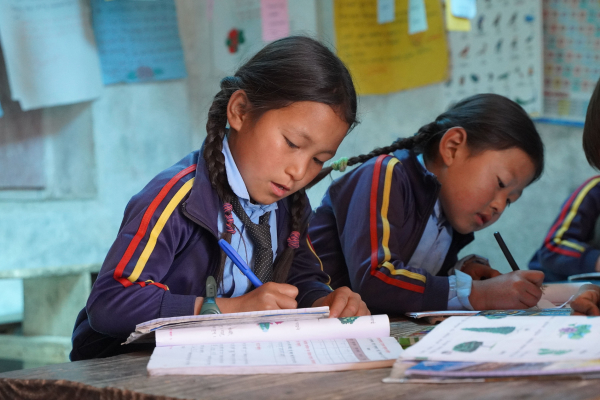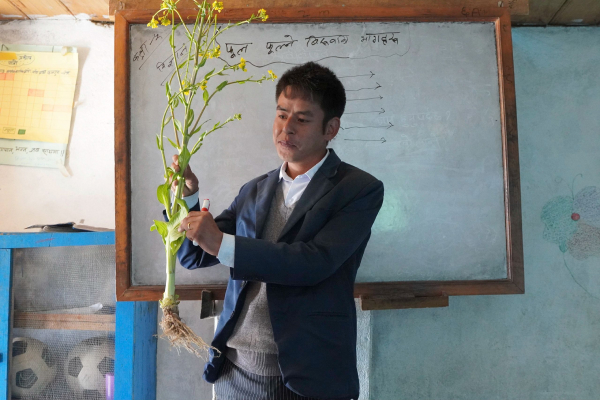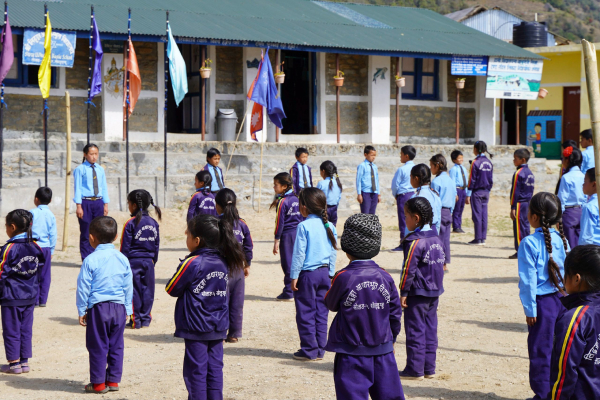Established in 2005, the Australian Himalayan Foundation’s flagship Teacher Training and Quality Education (TTQE) project is helping to ensure that children living in one of the poorest regions of Nepal have access to inclusive, high quality primary education for improved opportunities now and into the future.
A range of activities designed to identify and address the needs of the school community are being implemented, including: teacher training; literacy programs; parent volunteer opportunities; facilitating school representatives in planning and milestone setting; support to child-led clubs; and providing materials for classroom and school upgrades.
TTQE focuses on developing schools in the Solukhumbu district of Nepal to become models of excellence (“Namuna” schools) with quality teachers and educational resources which provide safe and supportive learning environments.
Key Project Outcomes 2018/2019
Following an evaluation and project redesign process, 2018/2019 was the first year of a new three-year project phase. The key achievements that year included:
- 1,553 students (790 girls) at 14 schools accessed improved quality education via TTQE schools
- 860 children in grades 1-3 were provided with literacy materials
- 34 children accessed improved nutrition via school meals pilot program
- 489 very vulnerable children received financial and material assistance to continue schooling
- 180 students and 60 teachers received orientation in hygiene practices, and new hand-washing facilities were provided at 7 schools
By supporting AHF’s Teacher Training and Quality Education (TTQE) Project, Footprints donors helped create a significant impact on local communities in Nepal. Below are some of the ways your donations were spent.
- Early grade materials and activities for 736 children (349 female) in 14 schools, and resources procured for 14 additional schools when open again after COVID
- 8 teachers received library management training
- 14 Reading Motivators (13 women) were trained and appointed in 14 schools
- 12 radio lessons (1 per week) in Nepali literacy delivered up to end of July 2020
- 186 disadvantaged students received radios to access remote schooling
- 74 people (38 male and 36 female including 3 children with disabilities; 2 male and 1 female) oriented in First Aid

Project Objectives 2019/2020
- For Namura (model) schools to be meeting their milestones
- Children read and write competently in Nepali by grade 3
- Children meet/exceed prescribed government competency and benchmark standards in English, Maths and Science at basic level schools.
- Very disadvantaged children, girls and children with disabilities are supported to attend and continue schooling
- Gender and social inclusion strengthened in education delivery

Key Project Outcomes 2018/2019
The delivery of the TTQE program was impacted by COVID-19 but in 2019/2020 Footprints donations, in conjunction with funding from private donors and the Australian government, helped achieve the following significant outcomes:
- 170 teachers (63 female; 2 people with disability) received accredited subject training in English (57), Maths (56), Science (57)
- 77 classes in English, Maths, Science (25-26 each subject) were developed and delivered via radio (to end of July 2020)
- 384 children (243 girls; 24 children with disabilities) received full Going to School support materials and cash support
- 5 female senior students engaged in higher-level technical training with project support
- 153 children (69 girls; 3 children with disabilities) accessed school meals in 4 schools
- 834 people (500 female) from vulnerable households accessed counselling and awareness raising activities on education, child rights and protection

What’s Next?
TTQE is an ongoing project based in Solukhumbu Nepal.
Can I visit this project?
AHF can make special arrangements for supported visits to projects depending on the current priorities and resources of our NGO partner and the schools at the time.
Project background
The Australian Himalayan Foundation works in partnership with the people of the Himalaya to help the most disadvantaged meet their priority needs through integrated improvements in education, health and the environment.
At the heart of AHF’s efforts is always the aim to provide better opportunities in life for people in the remote Himalayan mountains. As such, our flagship Teacher Training Quality Education (TTQE) program, which commenced in 2005, continues its long running efforts in Nepal to deliver quality, inclusive education.
This is achieved through up-skilling teachers, strengthening school governance, providing educational resources and empowering children, parents, and school committees. In 2018, the project piloted the development of a new “Namuna” or model school and early grades literacy improvement project.
This approach has already seen positive results with a dramatic increase in learning achievement in Nepali in the pilot schools whereby students have demonstrated results of up to 12% above the average in the school districts.

Project overview
Since 2005, the AHF’s TTQE program has been delivered in the remote Solukhumbu region of Nepal. The program strives to provide quality, inclusive education to the children in this region. AHF works with its partner REED Nepal to continuously improve opportunities through education.
Based on recent reviews, the focus of the program has shifted to focus on “Namuna” or model schools and early grade literacy. A new three-year TTQE program aims to deliver on four key objectives:
- To develop and strengthen targeted schools to become centres of excellence.
- To introduce and develop a Children’s Literacy Improvement Program.
- To strengthen skills to teach and develop core competencies in English, Maths and Science.
- To support very disadvantaged children to access and complete schooling.
The TTQE Program continues to be delivered in close collaboration with the Nepalese Government’s National Centre for Educational Development (NCED), with the teacher training program being the only NGO-run training courses that are government accredited in the country. Through this collaboration, the project embeds quality education approaches beyond the scope of the program alone. There are increased sustainable impacts of the program as TTQE training modules are taken to teachers from other districts in the country by REED and NCED.

What's covered in project cost
The funding through The Footprints Network will cover:
- Supporting AHF community partner REED to travel to the Everest region for training and in-school support
- Teaching resources and aids
- Training workshops
- Provision of training materials
- Travel costs and other fees for trainers and volunteer teachers
- Funding related to program monitoring and evaluation

Partners and community involvement
Accredited by the Nepalese Government’s National Centre for Education Development and implemented in coordination with the Ministry of Education, AHF’s Teacher Training and Quality Education program is recognised as one of the most comprehensive education programs in Nepal.
TTQE is implemented by the AHF’s Nepalese NGO partner REED Nepal with technical support from the AHF in areas such as program design, management, monitoring and evaluation. Monitoring and evaluating underperforming schools and teachers encourages better outcomes through in-school support, which continues to be an effective means to support the implementation of teacher training. Trainers from REED visit the schools in remote communities to observe the training in-school and provide valuable feedback and ongoing support.
The Australian Himalayan Foundation is a registered charitable organisation, a member of the Australian Council for International Development and accredited by the official Australian Aid program (DFAT).

Part of a larger strategy
The Teacher Training Quality Education program continues to deliver on its long term goal of providing better opportunities in life for children in the remote Solukhumbu region of Nepal through improving the quality of education.
This continues to be achieved through the up-skilling of teachers, strengthening and school governance, providing educational resources, and empowering children, women, parents and community members.
We are continuing to work with REED to identify and address the key barriers to children attending school. A specific example of this is a recent pilot project of providing school lunches to young children. Early results positively indicate this has addressed school hunger and keeps children in school for the whole day. REED will look to replicate this model and other strategies across the schools in the Solukhumbu.
This project continues the work of a previously funded Footprints project.